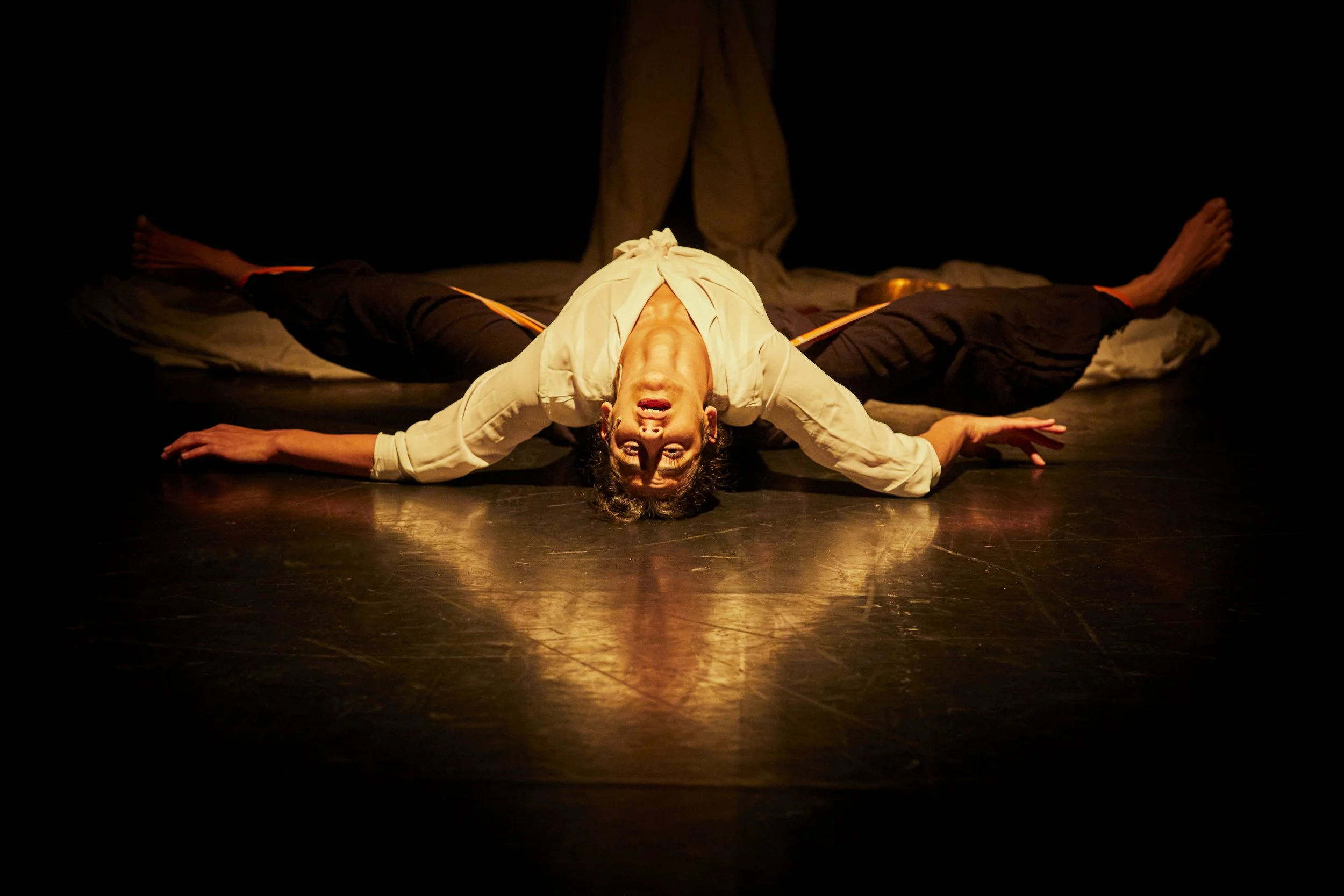To fall and find a country in the home of your body
Responding to Cosmos by Ashtar Muallem
Ashtar Muallem / Photograph: Christophe Raynaud de Lage
I’ve been doing aerial for about a year now, an impulse which probably originated, full circle, at the Fringe, and with a fascination of performers who could occupy impossible states of tension with ease. People have asked me if it makes me feel strong, or powerful, or at peace with my body, but I am not sure it does. I think my relationship with my body is past such interventions. It has been ruled by other things for so long now – hormones and magazines from the noughties and a pervasive sense of panic – that I’m not sure 90 minutes a week can fix it. Still, I like the temporary sense of uncanniness, the childlike impulse to be upside down, or knotted up high, or balanced precariously, as if the rules of nature momentarily do not apply. Perhaps there is something healing there; far from being at peace with your body, your body is no longer at peace with the world, living in entirely other dimensions.
“My body is my country,” Palestinian aerial artist Ashtar Muallem explains, minutes into her Edinburgh Fringe show Cosmos. “After all, the first place we live is our bodies.” Ruptured from her homeland of Palestine in ways both immediate and existential – living in France where she went to circus school, watching Palestine itself melt away under increasing occupation, land seizures, and newly erected border walls – Muallem turns instead to the body as a potential space of belonging. Over and over, she examines the strange intrusions enacted on the body to make it liveable, to make it a homeland when no other such one exists. She cannot take them seriously. “Inhale, exhale,” she says kindly to the audience, as if any such breathwork can centre a body experiencing violent occupation and dislocation, moving her legs behind her head with a resistance band, stretching and bouncing at all times. She inhabits various characters: the history of the Nakba is delivered with an aerobic, Jane Fonda-like peppiness, the abolition of war offered with the snake oil charm of an influencer.
Again and again, her personas, steeped in irony, try to sell us something; peace, identity, spirituality delivered through shortcuts of tarot, ritual, yoga, and faith. But there exists an inescapably frenetic quality to it all, each pitch run through with a desperate rictus grin. It is only in the moments of aerial work, wrapped high in the silks, parcel climb and parcel climb and lock, that Muallem achieves a stillness. “Inhale, exhale,” she tells us again, this time through the blooming smoke of a vape, cocooned near the ceiling of Summerhall’s Main Hall. The discrepancy of it, the contortionist strength and the crackle of the lungs, the sudden surrender to despair, is an electric moment of honesty. Perhaps, if neither your land nor your body can be a country, another place can be carved out, caught in the air, rushed through with grief.
Ashtar Muallem / Photograph: Christophe Raynaud de Lage
For years now, I feel I have been trying to articulate what it means to have lost one homeland, and be alienated from another. Everything comes out in clichés. You are from both places, and neither place! You feel you never fully belong! Does the language help? The food? The history? The family? A friend asks me whether I feel Iranian, and I say that doesn’t entirely explain it, that perhaps the second-generation qualifier is what rings true the most, but I am not sure that is entirely true either. I’ve been trying on different words for so long – ‘diaspora’ feels soothingly expansive, ‘exile’ appealingly dramatic – but I am not sure there is a word for being from somewhere that no longer exists, either to you or to the world at large.
There is no ritual that can bring you back there, no body work that can make you feel calm in your own skin. Yet, perhaps there is something in the way Muallem is entangled in the silks, not as a process of healing but as a cipher for alienation, that can help to clarify this estrangement. Suddenly, there you are, caught between two states; between ground and air, solid and gas. This liminality exists as its own unnatural condition, where gravity and motion suddenly don’t apply. There’s no belonging up in the air.
The first rule of aerial, I have been told over and over as I slip out of the silks and land hard on the mat, is to know what keeps you up there. A hip lock with the knees tucked in and the fabric wrapped between, a gazelle with the thigh caught tight against the rope. If you know what is keeping you up, you can control it. Maybe I’ve been preoccupied for so long with where I am, and where I am not, and why, that I’ve forgotten to pay attention to what is anchoring me, to what is stopping me from falling. Watching Muallem, I try to think instead of what is keeping us both where we are. Tense but aloft, neither on the ground nor in the air.
Cosmos, Summerhall Main Hall, 1-11 Aug, 21:15


